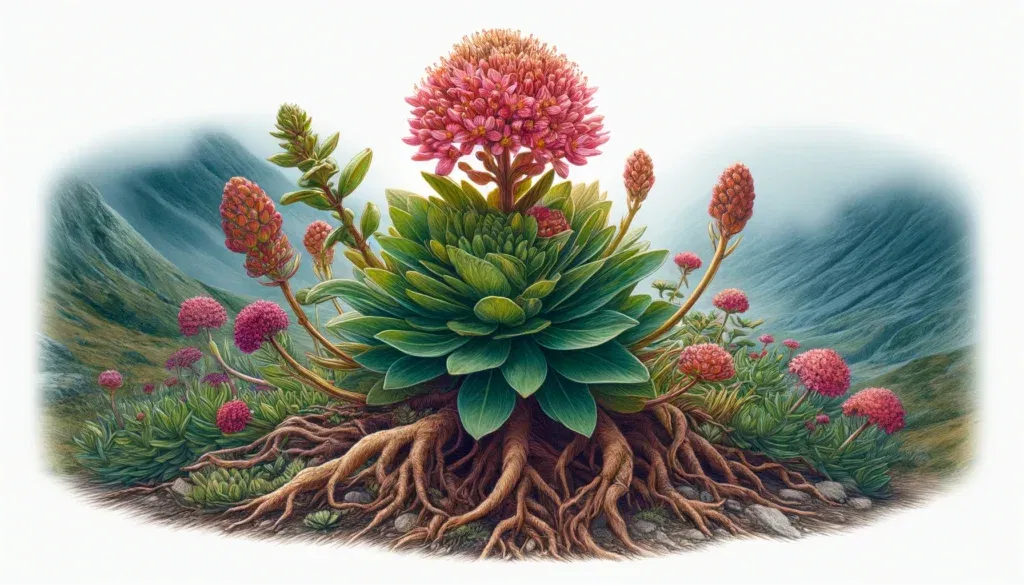Understanding Rhodiola Rosea and Its Role in Testosterone Modulation
Rhodiola rosea, a perennial herb with a long history of use in traditional medicine, has recently garnered significant attention for its potential effects on testosterone levels. This adaptogenic herb, primarily found in cold, high-altitude regions of Europe and Asia, has been utilized for centuries to combat stress, enhance mental clarity, and improve physical endurance. Modern scientific research has begun to explore its possible role in hormonal regulation, particularly in relation to testosterone. Given the growing interest in natural alternatives for hormone optimization, understanding how rhodiola and testosterone interact is crucial. The question that arises is: does rhodiola increase testosterone, or is its role more nuanced than a simple boost in hormone levels? To answer this, we must delve into the biochemistry of rhodiola extract, testosterone regulation, and the intricate balance between stress and endocrine function.
You may also like: How to Increase Testosterone Levels Naturally: Science-Backed Strategies for Men’s Health & Longevity
The Adaptogenic Properties of Rhodiola Rosea and Their Impact on Hormonal Balance
One of the most compelling aspects of rhodiola rosea is its classification as an adaptogen, a substance that helps the body resist physical, chemical, and biological stressors. Adaptogens are known to enhance homeostasis, the body’s ability to maintain stable internal conditions despite external fluctuations. Stress is a significant factor in hormonal imbalance, often leading to the suppression of testosterone production due to elevated cortisol levels. Chronic stress triggers the hypothalamic-pituitary-adrenal (HPA) axis, leading to prolonged cortisol secretion. High cortisol levels have been linked to reduced testosterone synthesis, as both hormones share precursor molecules within the endocrine system. By modulating the body’s stress response, rhodiola rosea may indirectly support testosterone production by preventing excessive cortisol accumulation. This raises the intriguing possibility that rhodiola’s effects on testosterone are mediated through its stress-reducing properties rather than direct hormonal stimulation.

Scientific Evidence: Does Rhodiola Increase Testosterone?
Several studies have investigated the potential relationship between rhodiola extract and testosterone levels, with mixed findings. Some research suggests that rhodiola rosea supplementation may have a mild androgenic effect, promoting testosterone synthesis in certain physiological conditions. Animal studies have indicated that rhodiola extract may stimulate the production of luteinizing hormone (LH), a key regulator of testosterone secretion in the testes. Increased LH levels can enhance the biosynthesis of testosterone, particularly in males experiencing hormonal decline. However, human studies have yielded less definitive results. While some trials report improved markers of anabolic activity and reduced stress-related testosterone suppression, others indicate no significant impact on baseline testosterone levels. The variation in outcomes may be attributed to differences in study design, dosages, and participant demographics. Despite these discrepancies, the potential for rhodiola rosea to support testosterone levels through stress modulation remains a promising area for further research.
Mechanisms of Action: How Rhodiola Rosea Influences Endocrine Function
To understand rhodiola rosea’s potential impact on testosterone, it is essential to examine its bioactive compounds and their effects on endocrine pathways. The primary active constituents of rhodiola include rosavin, salidroside, and tyrosol, which contribute to its adaptogenic properties. These compounds influence various physiological systems, including neurotransmitter activity, mitochondrial function, and hormonal regulation. One proposed mechanism is the herb’s ability to enhance the efficiency of mitochondrial ATP production, leading to increased energy availability and improved cellular function. This may indirectly support the hormonal synthesis processes, including testosterone production. Additionally, rhodiola has been found to modulate key enzymes involved in steroidogenesis, the biological pathway responsible for producing steroid hormones. By optimizing enzymatic activity and reducing oxidative stress, rhodiola may create a more favorable environment for testosterone synthesis.
Rhodiola Rosea and Athletic Performance: A Connection to Testosterone Enhancement?
Athletes and fitness enthusiasts often seek natural supplements to enhance performance, recovery, and hormonal balance. Given the established link between exercise and testosterone levels, rhodiola rosea’s role in physical performance may have implications for hormonal health. Research has demonstrated that rhodiola supplementation can reduce exercise-induced fatigue, improve endurance, and accelerate post-workout recovery. These benefits may indirectly contribute to optimized testosterone levels by allowing individuals to maintain a higher training intensity and frequency. Resistance training and high-intensity exercise are well-documented stimulators of testosterone production, and by mitigating physical exhaustion, rhodiola rosea may facilitate more effective training adaptations. Additionally, reduced post-exercise cortisol levels observed in rhodiola users further support the idea that the herb may help preserve testosterone by counteracting the catabolic effects of excessive stress.
Potential Side Effects of Rhodiola Rosea on Testosterone and General Health
Despite its numerous benefits, rhodiola rosea is not without potential drawbacks. Some users report side effects such as dizziness, dry mouth, gastrointestinal discomfort, and sleep disturbances. While these effects are generally mild and transient, they underscore the importance of appropriate dosing and individual sensitivity. Regarding its impact on testosterone, some concerns exist that excessive or prolonged rhodiola supplementation may disrupt hormonal homeostasis. Adaptogens, by nature, work to balance bodily functions, which means they do not necessarily elevate hormone levels beyond their natural set point. For individuals with already optimal testosterone levels, excessive rhodiola intake may not confer additional benefits and could even lead to unintended hormonal modulation. Furthermore, potential interactions with medications, particularly those affecting the nervous and endocrine systems, should be considered. Consulting with a healthcare professional before incorporating rhodiola rosea into a regimen is advisable, particularly for individuals with preexisting conditions or those taking hormonal therapies.
Practical Considerations: Dosage, Timing, and Synergistic Effects
For those interested in leveraging rhodiola rosea for its potential testosterone-supporting benefits, understanding proper dosage and administration is key. Research suggests that an effective dosage range falls between 200-600 mg per day, with standardized extracts containing at least 3% rosavins and 1% salidroside. Timing may also play a role in optimizing effects, with many users reporting enhanced mental clarity and energy when taken in the morning or before workouts. Combining rhodiola with other testosterone-supporting supplements, such as ashwagandha, zinc, and vitamin D, may create a synergistic effect, enhancing overall hormonal health. However, individual responses vary, and monitoring for both positive and adverse effects is essential when introducing any new supplement.

Frequently Asked Questions (FAQ) on Rhodiola Rosea and Testosterone
1. How does Rhodiola Rosea influence testosterone production?
Rhodiola Rosea is primarily known for its adaptogenic properties, which help the body manage stress. Chronic stress leads to elevated cortisol levels, which can negatively impact testosterone production. By reducing cortisol, Rhodiola Rosea may create a more favorable hormonal environment for testosterone synthesis. While some research suggests a potential link between Rhodiola Rosea testosterone levels, more studies are needed to confirm a direct impact. It is best used as part of a comprehensive approach to hormone health, including proper diet, exercise, and stress management.
2. Does Rhodiola increase testosterone in athletes?
Athletes often use Rhodiola Rosea to enhance endurance, recovery, and overall performance. While some evidence suggests that Rhodiola and testosterone levels may be positively correlated due to reduced fatigue and improved physical performance, the effects can vary. Athletes with high training loads may benefit from the adaptogenic effects of Rhodiola, potentially preserving testosterone levels that might otherwise decline due to overtraining. However, the impact may not be significant enough to replace other testosterone-boosting interventions, such as strength training and adequate sleep. Consultation with a sports nutritionist or endocrinologist can help determine the best supplementation strategy.
3. What are the potential side effects of Rhodiola on testosterone levels?
Although generally well-tolerated, Rhodiola side effects on testosterone have not been extensively studied. Some individuals may experience mild side effects such as dizziness, dry mouth, or digestive discomfort. If taken in excessive amounts, Rhodiola could theoretically alter hormonal balance, leading to unintended effects. Additionally, interactions with other medications or supplements could influence how Rhodiola affects testosterone metabolism. It is always advisable to start with a lower dose and monitor any changes in energy levels, mood, or performance.
4. Can Rhodiola extract testosterone-boosting effects be enhanced with other supplements?
Combining Rhodiola extract with other natural testosterone-supporting supplements may provide a synergistic effect. Zinc, magnesium, vitamin D, and ashwagandha are commonly used to support hormonal health. When paired with Rhodiola Rosea, these nutrients may help optimize testosterone levels by addressing multiple physiological pathways. However, individual responses vary, and excessive supplementation can lead to imbalances. It is essential to track hormone levels and consult with a healthcare professional before combining multiple supplements.
5. How long does it take for Rhodiola Rosea to affect testosterone levels?
The effects of Rhodiola Rosea testosterone benefits are not immediate and may take weeks to become noticeable. Adaptogenic herbs work gradually by helping the body adjust to stress and supporting overall homeostasis. Some users report improved energy and stamina within days, but hormonal changes, if they occur, may require consistent use over a period of weeks or months. For best results, Rhodiola should be incorporated into a balanced lifestyle that includes proper nutrition, exercise, and stress management.
6. Is there a difference between Rhodiola Rosea and other adaptogens for testosterone support?
Rhodiola Rosea is often compared to other adaptogens such as ashwagandha and ginseng, which also have potential effects on testosterone. Ashwagandha, for instance, has more clinical backing in terms of increasing testosterone directly. Rhodiola and testosterone interactions are more indirect, primarily through stress reduction and enhanced endurance. Choosing the right adaptogen depends on individual goals, health conditions, and personal response to supplementation. Some people benefit from combining multiple adaptogens for a well-rounded approach to hormonal balance.
7. Can Rhodiola Rosea benefit men experiencing age-related testosterone decline?
As men age, testosterone levels naturally decrease, leading to symptoms like fatigue, reduced muscle mass, and low libido. Rhodiola Rosea testosterone support may help mitigate some of these effects by reducing stress and improving energy levels. While it is not a replacement for medical interventions such as hormone replacement therapy (HRT), it can be a supportive supplement. Older men considering Rhodiola should also focus on lifestyle factors such as resistance training, proper sleep, and a nutrient-dense diet to maintain optimal hormone levels.
8. Does Rhodiola Rosea have different effects on testosterone in men and women?
Testosterone is present in both men and women, though in different amounts. Rhodiola and testosterone modulation may occur in both sexes, but the effects might be more noticeable in men due to higher baseline testosterone levels. In women, Rhodiola is more commonly used for stress relief, mood enhancement, and energy support. Women with hormonal imbalances should consult a healthcare provider before using Rhodiola, as its impact on estrogen and progesterone levels is not well-documented.
9. Can Rhodiola interfere with testosterone-related medications?
Individuals taking testosterone replacement therapy (TRT) or medications affecting hormone levels should be cautious when using Rhodiola Rosea. Rhodiola extract testosterone interactions are not fully understood, and there is potential for unintended effects. Some studies suggest that adaptogens can influence liver enzyme activity, potentially altering medication metabolism. Anyone on prescription treatments for hormonal conditions should discuss Rhodiola supplementation with their healthcare provider to avoid potential conflicts.
10. What is the optimal dosage of Rhodiola Rosea for testosterone support?
The ideal dosage of Rhodiola Rosea for testosterone benefits varies based on individual needs and supplement formulations. Most studies use doses ranging from 200 mg to 600 mg per day. Standardized Rhodiola extracts containing 3% rosavins and 1% salidroside are recommended for consistency and effectiveness. Higher doses may not necessarily enhance benefits and could increase the risk of Rhodiola side effects testosterone concerns. Starting with a lower dose and adjusting as needed is the best approach to finding the optimal amount for individual health goals.

Conclusion: The Role of Rhodiola Rosea in Hormonal Optimization
While the direct impact of rhodiola rosea on testosterone remains a topic of ongoing research, its ability to modulate stress responses, enhance physical performance, and support overall well-being makes it a valuable addition to many health regimens. By reducing cortisol levels and improving resilience to stress, rhodiola may create an environment conducive to optimal testosterone production, particularly in individuals experiencing chronic stress or fatigue. However, as with any supplement, individualized considerations, proper dosing, and holistic lifestyle factors must be taken into account. Future research will continue to uncover the full extent of rhodiola rosea’s effects on endocrine health, but current evidence suggests that its benefits extend beyond simple hormonal augmentation, offering a broader spectrum of physiological support for those seeking to optimize their well-being.
testosterone boosting supplements, herbal testosterone support, adaptogens and testosterone, rhodiola for stress relief, cortisol and testosterone balance, natural hormone optimization, rhodiola performance enhancement, best herbs for male health, rhodiola benefits for men, stress-induced testosterone suppression, exercise and testosterone production, testosterone-friendly adaptogens, rhodiola rosea hormonal effects, herbal supplements for testosterone, testosterone and adrenal function, rhodiola research findings, boosting testosterone naturally, testosterone and mental clarity, natural ways to support testosterone, rhodiola and sports performance
Further Reading:
Examining the Effects of Herbs on Testosterone Concentrations in Men: A Systematic Review
7 Science-Backed Health Benefits of Rhodiola rosea
Disclaimer: The information provided in this article is for general informational purposes only. The content does not constitute professional advice of any kind, including but not limited to medical, legal, or financial advice. HisHealthMag and its contributors make no representations or warranties regarding the accuracy, completeness, or reliability of the information presented. Always seek the advice of a qualified professional for any specific concerns or questions you may have. Neither HisHealthMag nor its authors assume any responsibility or liability for any actions taken based on the information provided in this article. The views and opinions expressed are those of the author(s) and do not necessarily reflect the official policy or position of HisHealthMag.





